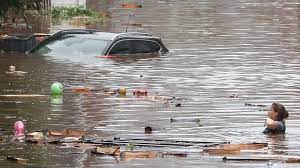The number of people, who have died in the devastating flooding in western Germany continues to rise.
This is as the death toll reaching more than 130 after police announced 90 fatalities in the Ahrweiler district on Saturday.
Saturday’s figure brings the total number of deaths in Germany’s western regions to 133, with 43 confirmed in North Rhine Westphalia late on Friday.
Rescue work continued across Europe where more than 150 people have died in the flooding after heavy rainfall hit parts of Germany, Belgium, France, Switzerland, Luxembourg and the Netherlands.
In Germany, the Police said on Saturday they feared more deaths would be confirmed in the Ahrweiler district, the focus of the crisis in the western state of Rhineland-Palatinate.
The Police there said they had received reports of 618 people injured.
In the Ahr valley area, where bridges are damaged and roads blocked, the Police asked the public to avoid the area where possible to keep routes clear for rescue vehicles.
Many are still missing more than two days after massive flooding hit the region and search and rescue efforts are ongoing.
Images of devastation have shocked the nation.
Over 19,000 emergency forces are working in rescue operations in the state of North Rhine Westphalia, according to the regional government.
Some 700 residents of Ophoven were evacuated from their homes on Friday evening after a dam broke in the Heinsberg district in the western state.
The situation remained tense early on Saturday morning, according to a statement issued by the town that is close to the Dutch border.
It was unclear how much damage had been caused by the dam breaking on the Rur River, which flows from Germany through the Netherlands and Belgium.
Later on Saturday, President Frank-Walter Steinmeier is due to visit North Rhine Westphalia.
He is expected in the Rhein-Erft district and is then due to join state premier, Armin Laschet, in a visit to Erftstadt, where numerous houses and cars were washed away in recent days.
In Erftstadt-Blessem several buildings and parts of a historic castle, were destroyed due to a sink hole and major landslides.
State Interior Minister, Herbert Reul, said on Friday evening it was assumed several people in Erftstadt had died but the situation was not yet clear.
Emergency workers are still searching for those missing there.
Water levels have dropped in other parts of the area, a district spokesperson said.
Meanwhile, Bundeswehr troops have begun clearing cars stuck in the floods on a nearby main road using light wheeled tanks.
So far no one has been found in the cars and lorries the Erftstadt fire brigade said on Saturday.
This is after there had been fears that some might not have escaped in time when numerous vehicles were flooded on a motorway.
Steinmeier plans to gain an overview of the situation and speak to emergency services.
Chancellor Angela Merkel pledged support for those affected by flooding during a Friday video conference with Laschet, who is also the frontrunner to succeed Merkel at the September election.
Merkel also plans to travel soon to hard-hit parts of Rhineland-Palatinate.
Thousands of emergency workers are in the Eifel region, where the deluge devastated entire towns on Thursday night.
More than two days later, people are still missing.
Damaged power and telephone lines and interruptions to mobile phone services made it harder to locate people.
Initial forecasts for Rhineland-Palatinate showed the danger of flooding had fallen, although warnings remained in place around the Ahr River and the tributaries of the lower Sauer.
The Green Party candidate, Annalena Baerbock, also travelled to the region on Friday after ending her holidays early.
She praised the way people were supporting each other and taking in those affected, in a tweet.
Germany’s Agriculture Minister, Julia Kloeckner, told the Neuen Osnabruecker Zeitung newspaper’s Saturday edition that climate protection efforts needed to be ramped up, both in Germany and worldwide, since such “extreme weather events” would only occur more often in the future. (dpa/NAN)

